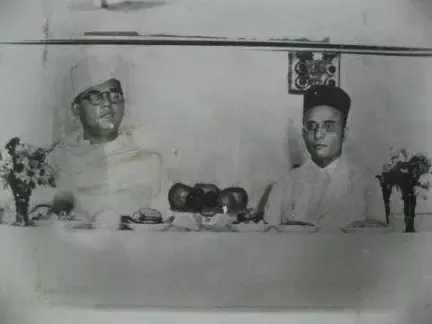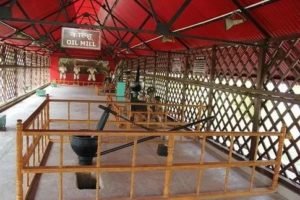Why Congress fears Savarkar and spreads lies about him? Part-1


Recently, the Indian National Congress has labelled Savarkar a traitor, while comparing with Bhagat Singh, a martyr. This comes due to the political vendetta against an ideology represented by Savarkar. Savarkar coined the word ‘Hindutva’ & defined the Hindutva ideology, which is followed by many Hindu nationalist organisations like RSS, the opponents of Congress.
Rahul Gandhi’s reference to Savarkar as RSS founder is incorrect, as Veer Savarkar was neither a founder, nor a member of RSS. Further we can say that people enjoying comfortable life in AC rooms have no moral right to speak about Savarkar’s life in harsh conditions of Andaman prison.
Congress has called Veer Savarkar a traitor, because he wrote clemency petition in Andaman Jail.
Anyone having read ‘My Transportation for Life’ will understand the hollowness of these claims.
First of all, petitions were the only way of making any sort of request in the Andaman Jail. Each demand was to be fulfilled by petitioning. Further, Savarkar has simply used a formal legal language, as he was a barrister.
Further, Savarkar had no intentions of rotting inside the Andaman jail.
Savarkar simply believed that it is the primary duty of every revolutionary to free himself from the clutches of the British in order to return to the freedom struggle. He often expressed this opinion before the fellow revolutionaries imprisoned at Andaman.
Simple question : How is rotting in jail going to practically contribute to the freedom struggle?
Apart from gaining sympathies from few countrymen or inspiring few patriots, it has no practical major consequence. Further, the prison administration took care that the condition of prisoners in jail is always kept secret. As Savarkar writes in My Transportation for Life :
A prisoner in the Andamans was permitted to write only one letter home during the year. The letter had, perforce, to be as brief as possible. Again, it was to be an open letter, to be censored first by the jailor, next by the Colonial Officer, and to be despatched if approved by them. Every prisoner was warned that the letter shall not be forwarded if it breathed a single word against the jail authorities. Thus only a slip of a letter could be sent by him home once every year. Even this small facility was taken away from him for the year if he was guilty of the slightest offence like talking to a fellow-prisoner, committing nuisance outside the stated hours, not sitting in a line, so on and so forth. One can imagine how difficult it was to be free from any trivial offence of the kind we have mentioned, during the course of three hundred and sixty-five days. It was impossible, therefore for any prisoner in the Andamans to convey any news about him to the outside world. It need not be said that it was also impossible for the outside world to send any news to him. The prisoner, in these circumstances, could not write even two lines, every year without fail, to inform his people at home that he was alive. [1]
A lot of people died due to harsh conditions in Andaman. How did their death contribute to the freedom struggle? Nothing.
How many freedom fighters do you remember, who died in Andaman? I am sure you will remember very few! These people died, their bodies simply thrown in the Andaman basement & then nobody remembers them.
Prisoners in Andaman were subjected to torture. Torture is much more painful than death. Torture is the worst punishment of all.
Savarkar was the only person sentenced to with transportation for life in Andaman twice.(This means total 50 years). Savarkar was 28 then. Given the harsh conditions in jail, it was impossible to live there for 50 more years.
Savarkar didn’t ask for complete release in the clemency petition. He had actually asked for what his legal rights were. It should be noted that Savarkar was NOT supposed to be kept in prison “cell” for 50 years. Normally after 3 years the prisoners were sent outside the prison, but within Andaman to work and later to settle and even bring their families from India. If they were not married they could do so.
Savarkar didn’t ask for release. I’ll reproduce the part of Savarkar’s petition to show what he actually asked :
Either please to send me to Indian jail for there I would earn
(a) remission;
(b) would have a visit from my people come every four months for those who had unfortunately been in jail know what a blessing it is to have a sight of one’s nearest and dearest every now and then!
(c) and above all a moral – though not a legal – right of being entitled to release in 14 years;
(d) also more letters and other little advantages.
OR
if I cannot be sent to India I should be released and sent outside with a hope, like any other convicts, to visits after 5 years, getting my ticket leave and calling over my family here. If this is granted then only one grievance remains and that is that I should be held responsible only for my own faults and not of others. [2]
Savarkar is simply asking what his legal rights were. Even the legal rights which were alloted to prisoners by the British govt, were denied specifically to Savarkar. Because Savarkar was considered more dangerous than other prisoners. Even his badge in Andaman Cell had the ‘D’ (D for dangerous) symbol. He was often blamed for someone else’s mistakes & punished unfairly. Savarkar hasn’t apologised at all, he has simply asked for his legal rights!
When World War I broke out, Savarkar sent petition to the Government of India in 1914. He averred that were the British to grant Colonial Self-Government to Hindusthan and majority in Central Legislative Council, revolutionaries would help Britain in the War. He gave instances of European Governments setting their political prisoners free and even those of the liberation of political prisoners in Ireland to prove his point.
In this context, he writes in ‘My Transportation for Life’ :
Let them release us to convince the people that England was willing to break the chains that had held India in thrall. We pledged our word of honour that we would exert our utmost to bring recruits to the Indian army in large numbers that would equip her to stave off the invasion of India from the North by the forces of Afghanistan and Turkey, and to march to any from that needed her presence to fight the foe and beat him. We would offer ourselves as volunteers to serve in that army in defence of India and for the victory of England. Release us, I said, equip India with colonial self-government, and win the loyalty and love of her people. That would assure to Government all the co-operation that it needed from the people in the present crisis. Let it not miss that splendid opportunity. In case the Government suspected, I wrote in conclusion, my motive in writing the letter, I offered to do without any release for myself personally. Let them release all the political prisoners in the country leaving me alone in my own cell in the Andamans. I shall rejoice in their freedom as if it was my own. The Government was right in suspecting me; perhaps, when free, I might lead an agitation to break the peace in India. I had not written the letter to seek my own liberation, or to compel them to set me free along with other political prisoners involved in similar or the same political conspiracies. Hence I had made the proposal to keep me back and set all others free. [3]
This clearly means that his proposal was selfless & he was more interested in getting other political prisoners free.
Further :
The Superintendent agreed to forward the letter and I wrote in it as follows; I Wrote that I felt it my duty, as intimately connected with the revolutionary movement in India, to inform the Government, in its distracted state of mind, what I thought about the present situation in India vis-a-vis the war between England and Germany. It was our ideal, I Wrote, to win independence for India, and it remained our ideal even that day. But we were not sworn to violent means alone to achieve that independence. If any other sure means were available to us before for that purpose, we would not have gone in at all for terrorist and revolutionary methods. [4]
It is important to note that Savarkar wrote ‘My Transportation for Life’ when he was still under house imprisonment (1925-26).
Now, lets have a look at his prison life.

To be continued….
DISCLAIMER: The author is solely responsible for the views expressed in this article. The author carries the responsibility for citing and/or licensing of images utilized within the text.
